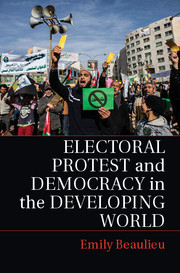Book contents
- Frontmatter
- Dedication
- Contents
- Tables and Figures
- Acknowledgments
- 1 Introduction
- 2 Elite Bargaining and Elections in the Developing World
- 3 Causes of Electoral Protest
- 4 Election Day and Its Aftermath
- 5 Democratic Consequences of Electoral Protest
- 6 Conclusion
- Appendix A Data Description and Robustness Checks
- Appendix B. Boycotts
- Appendix C. Post-Election Mass Demonstrations
- Appendix D. Election-Related Reforms
- References
- Index
- References
5 - Democratic Consequences of Electoral Protest
Published online by Cambridge University Press: 05 June 2014
- Frontmatter
- Dedication
- Contents
- Tables and Figures
- Acknowledgments
- 1 Introduction
- 2 Elite Bargaining and Elections in the Developing World
- 3 Causes of Electoral Protest
- 4 Election Day and Its Aftermath
- 5 Democratic Consequences of Electoral Protest
- 6 Conclusion
- Appendix A Data Description and Robustness Checks
- Appendix B. Boycotts
- Appendix C. Post-Election Mass Demonstrations
- Appendix D. Election-Related Reforms
- References
- Index
- References
Summary
Haiti has experienced a string of contentious elections since the late 1980s. Parliamentary elections in May 2000 were marked by violence and administrative irregularities, most typically the late opening of polling stations. Chaotic delivery of the ballot boxes to the electoral commission after the elections (some poll workers simply left ballot boxes outside the commission's building, unguarded overnight, because they could not find room inside) also raised the specter of electoral malfeasance. Despite these problems, observers described the elections, in which incumbent Aristide's Lavalas Party candidates were expected to win, as “generally credible.” However, even before the official results were announced, the Lavalas Party declared victory, and opposition parties called for the election results to be annulled. International donors reacted to these events by threatening to suspend aid to Haiti. Opposition parties objected to the preliminary results that showed Lavalas winning most of the available senate seats and withdrew their candidates from the runoff elections. But it was Lavalas supporters who protested, demanding that the final results be released and that the OAS recognize the Lavalas victory as legitimate. The resulting conflict caused the head of Haiti's election commission to flee to the Dominican Republic and then to the United States.
Opposition parties in Haiti boycotted the November presidential election that year on the grounds that the government had cheated in the May parliamentary elections to pave the way for Aristide's reelection. Although the November election appeared to be less violent than some previous contests, bombings still occurred, and the OAS criticized it as being held without attention to “critical deficiencies” of the current system. Aristide won the election, but international aid remained suspended on the grounds that the opposition complaints needed to be resolved. The opposition refused to meet with Aristide in a standoff that persisted for nearly two years, at which point the United States suggested unblocking aid to Haiti in September 2002, with certain conditions, which included the creation of a new election management body. The OAS eventually succeeded in receiving agreement from both the incumbent and the opposition on the terms proposed by the United States. This agreement, however, did not alleviate political tensions in Haiti, and by 2004, Aristide had been forced out of office. UN peacekeepers then occupied Haiti for two years and fresh elections were held in 2006.
- Type
- Chapter
- Information
- Electoral Protest and Democracy in the Developing World , pp. 97 - 125Publisher: Cambridge University PressPrint publication year: 2014



